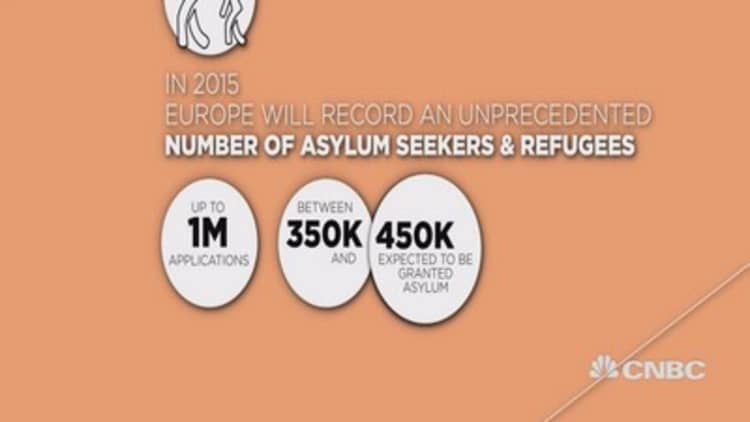
Europe has received 700,000 asylum applications so far this year, compared to 630,000 for the whole of 2014. This figure could reach a million by the end of the year, according to the latest policy briefing from the Organization for Economic Co-operation and Development (OECD).
The last time the number of applications to Europe reached 630,000 was in 1992 during the conflict between Serbia and Bosnia. In addition, the OECD expects between 350,000 to 450,000 applications to be granted, which would be more than any previous refugee crisis since World War II.
However, the Paris-based body claims Europe is better prepared than ever before to deal with the migrant crisis that has dominated headlines for the past few months.
"Europe has better legal and institutional systems in place for asylum-seekers and migrants than it did in the 1990s," the OECD writes in its report published Tuesday.
"However, these have not ensured a fair burden-sharing between countries, and have not prevented people from choosing smuggling routes."
The report includes a number of revealing statistics about the current European migrant crisis, such as how Syrian refugees tend to be better-educated than other groups.
"According to Statistics Sweden, more than 40 percent of Syrians in the country in 2014 have at least upper secondary education, compared to 20 percent of those from Afghanistan and 10% for those coming from Eritrea," the report states.
Read MoreHow smartphones are helping refugees in Europe
The International Rescue Committee (IRC), which has been helping migrants and refugees arriving on the Greek island of Lesbos, called on European leaders to find a solution to the crisis in light of the OECD's findings.
"Another 300,000 refugees coming to Europe means another 300,000 people risking their lives crossing choppy seas, arriving on Greek islands without proper facilities and facing fences and troops on Europe's borders," Chelsea Purvis, IRC's policy and advocacy officer, told CNBC in an email.
"EU leaders meeting on Wednesday must agree to share responsibility and support refugees fairly across the continent. Misguided efforts to focus on sealing border crossings will only increase the price refugees pay to criminal gangs to reach the other side."
Read MoreCounting the cost of Europe's migrant crisis
The OECD also noted the potential long-term benefits of migration.
"Europe has the proven capacity and the experience to find means to deal efficiently and appropriately with large migration movements. The work of the OECD shows that migration, if well managed, can play a positive role in the economy and notably that immigrants tend to pay more in taxes and social security contributions than they receive in individual benefits."
But in order to benefit, the report does point out that states will need to ensure migrants gain access to labor markets and are integrated into society, which will require high short-term costs such as housing, schooling and teaching migrants the country's language.
For instance, Germany expects to receive 800,000 asylum-seekers and refugees this year. According to the Ifo, an economic think-tank, this would cost the state ten billion euros.
"It also important to strike the balance between avoiding creating new high concentration areas of recent immigrants and accommodate people where jobs are and not simply cheap housing is," the OECD report adds.
Follow Luke on Twitter: @LukeWGraham

